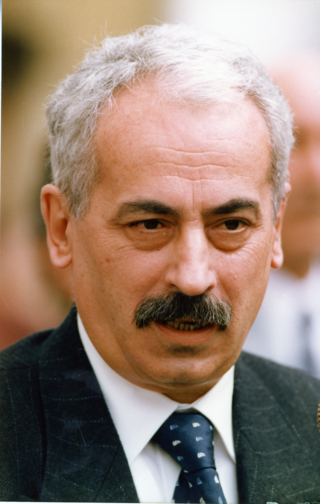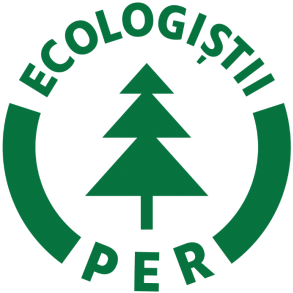AutoLISP is a dialect of the programming language Lisp built specifically for use with the full version of AutoCAD and its derivatives, which include AutoCAD Map 3D, AutoCAD Architecture and AutoCAD Mechanical. Neither the application programming interface (API) nor the interpreter to execute AutoLISP code is included in the AutoCAD LT product line. A subset of AutoLISP functions is included in the browser-based AutoCAD web app.

The National Peasants' Party was an agrarian political party in the Kingdom of Romania. It was formed in 1926 through the fusion of the Romanian National Party (PNR), a conservative-regionalist group centred on Transylvania, and the Peasants' Party (PȚ), which had coalesced the left-leaning agrarian movement in the Old Kingdom and Bessarabia. The definitive PNR–PȚ merger came after a decade-long rapprochement, producing a credible contender to the dominant National Liberal Party (PNL). National Peasantists agreed on the concept of a "peasant state", which defended smallholding against state capitalism or state socialism, proposing voluntary cooperative farming as the basis for economic policy. Peasants were seen as the first defence of Romanian nationalism and of the country's monarchic regime, sometimes within a system of social corporatism. Regionally, the party expressed sympathy for Balkan federalism and rallied with the International Agrarian Bureau; internally, it championed administrative decentralization and respect for minority rights, as well as, briefly, republicanism. It remained factionalized on mainly ideological grounds, leading to a series of defections.

The Ecological Green Party of Mexico is a green political party in Mexico.

Victor Ciorbea is a Romanian jurist, politician, and civil/public servant. He was the Mayor of Bucharest between 1996 and 1997 and, after his resignation from this public dignity/position, Prime Minister of Romania from 12 December 1996 to 30 March 1998. He had also served as the Ombudsman between 2014 and 2019.

Ion Mihalache was a Romanian agrarian politician, the founder and leader of the Peasants' Party (PȚ) and a main figure of its successor, the National Peasants' Party (PNȚ).

Gheorghe G. Mironescu, commonly known as G. G. Mironescu, was a Romanian politician, member of the National Peasants' Party (PNȚ), who served as Prime Minister of Romania for two terms.

Radu Vasile was a Romanian politician, historian, academic/professor, and poet.

The Romanian Ecologist Party is an ecologist and currently mostly conservative and green conservative political party in Romania, member of the AER Alliance for Romania. Without parliamentary representation, it is one of the microparties still active in the country with some representatives elected in the local administration, especially in Râmnicu Vâlcea and Vâlcea County, where it is ranked third behing the National Liberal Party (PNL) and the Social Democratic Party (PSD), Romania's two largest parties. Previously, it collaborated with the Green Party (PV) in the 2008 legislative elections.

The Timorese Nationalist Party is a political party in East Timor. Founder and President is Abílio Araújo, who was FRETILIN representative overseas during the Indonesian occupation until his dismissal in 1993.

Corneliu (Cornel) Coposu was a Christian Democratic and liberal conservative Romanian politician, the founder of the Christian Democratic National Peasants' Party, the founder of the Romanian Democratic Convention, and a political detainee during the communist regime. His political mentor was Iuliu Maniu (1873–1953), the founder of the National Peasant Party (PNȚ), the most important political organization from the interwar period. He studied law and worked as a journalist.

The Romanian Front was a moderate fascist party created in Romania in 1935. Led by former Prime Minister Alexandru Vaida-Voevod, it originated as a right-wing splinter group from the mainstream National Peasants' Party (PNȚ). While in power, Vaida had an ambiguous approach to the Iron Guard, and constructed his own radical ideology; the FR had a generally xenophobic program of positive discrimination, being implicitly antisemitic. It was subsumed to the policies of King Carol II, maneuvering between the mainstream National Liberals, the PNȚ's left-wing, and the more radically fascist Guardists. Vaida tried to compete with the former two and appease the latter, assuming fascist trappings such as the black-shirted uniform. Like the Guard, he supported aligning Romania with the Axis powers, though he also hoped to obtain their guarantees for Greater Romania's borders. The FR's lower echelons included Viorel Tilea and other opponents of Vaida's approach, who believed in Romania's attachments to the League of Nations and the Little Entente.
The Peasants' Party was a political party in post-World War I Romania that espoused a left-wing ideology partly connected with Agrarianism and Populism, and aimed to represent the interests of the Romanian peasantry. Through many of its leaders, the party was connected with Poporanism, a cultural and political trend in turn influenced by Narodnik ideas. In 1926, it united with the Romanian National Party to form the National Peasants' Party (PNȚ).

The Tămădău affair was an incident that took place in Romania in July 1947. It was the source of a political scandal and show trial.

General elections were held in Romania on 19 November 1946, in the aftermath of World War II. The official results gave a victory to the Romanian Communist Party (PCR), its allies inside the Bloc of Democratic Parties, together with its associates, the Hungarian People's Union and the Democratic Peasants' Party–Lupu. The event marked a decisive step towards the disestablishment of the Romanian monarchy and the proclamation of a Communist regime at the end of the following year. Breaking with the traditional universal male suffrage confirmed by the 1923 Constitution, it was the first national election to feature women's suffrage, and the first to allow active public officials and army personnel the right to vote. The BPD, representing the incumbent leftist government formed around Prime Minister Petru Groza, was an electoral alliance comprising the PCR, the Social Democratic Party (PSD), the Ploughmen's Front, the National Liberal Party–Tătărescu (PNL–Tătărescu), the National Peasants' Party–Alexandrescu (PNȚ–Alexandrescu) and the National Popular Party.
Constantin Remus Opriș was a Romanian politician and psychiatrist, a prominent member of the Christian Democratic National Peasants' Party (PNȚ-CD) and former Minister-Delegate for Local Administration in the 1996–1998 Victor Ciorbea cabinet. He was a member of the Chamber of Deputies elected for Prahova County for three consecutive terms, between 1992 and 2000.
Local elections were held in Romania in 2000 with a runoff for mayors. In which the PDSR won a majority. Bucharest's mayor becoming Traian Băsescu. Who continued the PNT-CD's strong hold over Bucharest's politics

Teniente Julio Gallardo Airport, is an airport serving Puerto Natales, a city in the Magallanes Region of Chile. The airport is 7 kilometres (4.3 mi) north-northwest of Puerto Natales, which is on the Admiral Montt Gulf (es), a long fjord that reaches inland close to the border with Argentina. The airport is 12 kilometres (7.5 mi) from the border.

The Romanian Social Democratic Party was a social democratic political party in Romania. Founded in 1990, shortly after the fall of the Communist party rule in Romania in December 1989, it claimed to be the direct successor of the historical Romanian Social Democratic Party (PSD) which existed between 1927 and 1948, until it merged with the Romanian Communist Party (PCR) to create the Romanian Workers' Party (PMR).

The National Peasants' Party–Alexandrescu was a political party in Romania.














